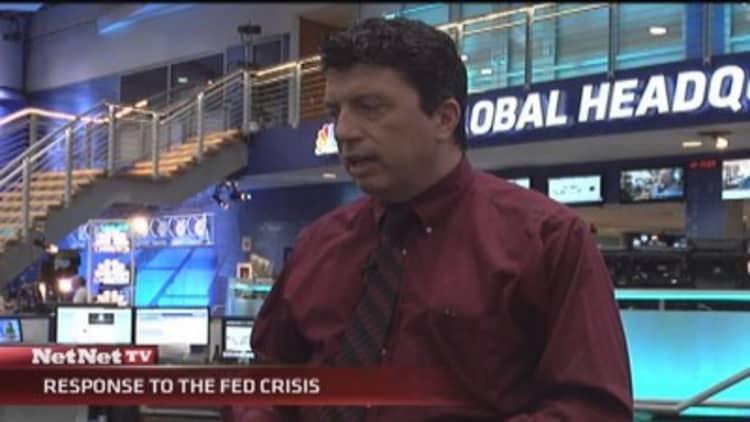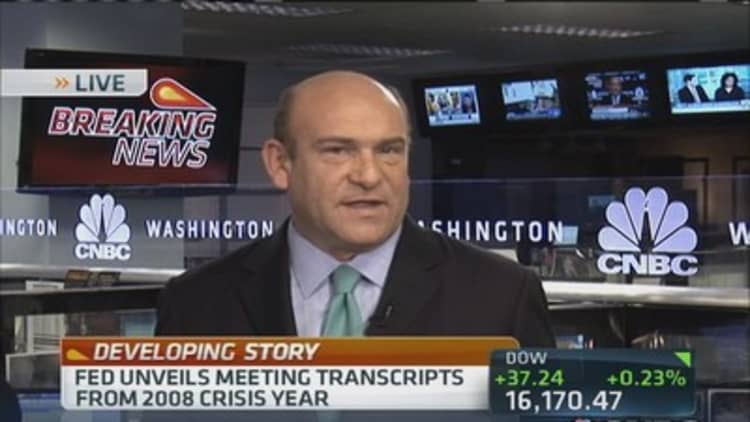
Even for an entity used to doing heavy lifting when it comes to supporting the U.S. economy, 2008 was a historic year for the Federal Reserve.
The central bank was left to grapple with the worst downturn since the Great Depression and was challenged to come up with innovative tools to get the economy back on its feet.
Transcripts from that year's meeting, released in a massive document dump Friday, show the depths of Fed deliberations as a crisis on Wall Street threatened to tear the global economy apart.
As policy makers rushed in to save Bear Stearns and AIG but not Lehman Brothers, then-Chairman Ben Bernanke considered the ramifications.
"There have been criticisms from the right and from the left," Bernanke said at the Oct. 28-29 meeting. "From the right, the initial criticism was that we have no business interfering with the market process. We should let them fail. The market will take care of it."
(Read more: Some Fed members raised idea of rate hikes)
"I never took this seriously," he added. "I just don't believe that you can allow systemically critical institutions to fail in the middle of financial crises and expect it to be not a problem."
The September emergency meeting, which came the day after Lehman Brothers filed for bankruptcy on the 15th, showed officials grappling with the full scope of the problem and trying to anticipate the landscape ahead. They often appeared to be groping in the dark in trying to devise solutions to the chaos.
"Personally, I see the prospects for economic growth in the foreseeable future as quite weak, notwithstanding the second quarter's strength," then-Chairman Ben Bernanke said. "I think what we saw in the recent labor reports removes any real doubt that we are in a period that will be designated as an official (National Bureau of Economic Research) recession."
Current Chair Janet Yellen saw things much the same way as she ruminated over the problems in housing and employment.
"The interaction of higher unemployment with the housing and financial markets raises the potential for even worse news—namely, an intensification of the adverse feedback loop we have long worried about and are now experiencing," she said from her position then as leader of the San Francisco Fed. "Indeed, delinquencies have risen substantially across the spectrum of consumer loans, and credit availability continues to decline."
Interestingly, Yellen advocated for no change in the funds rate, which was at 2 percent then. The Open Market Committee followed that meeting with successive cuts of 50 basis points at two October meetings and another 75 basis points in December.
(Read more: This jobs report should keep Yellen up at night)
During the otherwise-intense discussions at the September meeting, Yellen found a way to interject some levity—thought it was unclear if it was intentional—as she described economic conditions in her district. The transcript read:
"My contacts report that cutbacks in spending are widespread, especially for discretionary items. For example, East Bay plastic surgeons and dentists note that patients are deferring elective procedures. [Laughter] Reservations are no longer necessary at many high-end restaurants. And the Silicon Valley Country Club, with a $250,000 entrance fee and seven-to-eight-year waiting list, has seen the number of would-be new members shrink to a mere thirteen. [Laughter]
Yellen worried throughout the year about the economy and was an advocate both for aggressive asset purchases as well as knocking interest rates down to the zero-bound level, where they remain.
""It appears that the economy has stalled and may have fallen into a recession," Yellen said in April.
She noted tight credit markets as a major source of worry.
"Credit conditions have turned quite restrictive," Yellen said. "This credit crunch reflects the drying up of financing both for markets that were important sources of business and consumer credit and from banks that are contending with capital-depleting losses and illiquid assets."
(Read more: Markets flooded withcash, but what about risks?)
The year began with a drop in the red-hot housing market and the crumbling of the subprime mortgage industry that helped blow up the real estate bubble.
Yet there was hope—ultimately misplaced—at the Jan. 29-30 meeting that a recession would be avoided altogether.
"We are not forecasting a recession," board member Dave Reifschneider said. "While the model estimates of the probability of recession have moved up, they are not uniform in their assessment that a recession is at hand."
By the time the year was over, the Great Recession left some of the Street's most venerable names in the dust: Lehman Brothers, Bear Stearns, Merrill Lynch, Washington Mutual and a host of other financial powerhouses.

In October, weeks after the Lehman collapse, it became clear how bad things had gotten.
"It's more than obvious that we have an extraordinary situation," Bernanke said. "It is not a single market. It's not like the 1987 stock market crash or the 1970 commercial paper crisis. Virtually all the markets, particularly the credit markets, are not functioning or are in extreme stress. It's really an extraordinary situation, and I think everyone can agree that it's creating enormous risks for the global economy."
The Fed began cutting interest rates aggressively in January, with two cuts amounting to 1.25 percentage points, and by year's end had taken the policy rate down to nearly zero. It also began a bond-buying program that ultimately would take the central bank balance sheet past the $4 trillion mark.
In the transcripts there are detailed descriptions of the deliberations that helped the Open Market Committee make history.
Fed members clearly were torn over how to respond to the crisis.
With liquidity freezing up due to the Lehman collapse, members lobbied for interest rate cuts as well as the general policy accommodation that would come in November in the form of quantitative easing. Not all members, though, were on board with the Fed taking extreme measures.
"I would say to you, in dealing with that stress, I am fully supportive of the actions that we take in terms of liquidity—the (Term Auction Facility) and the other efforts to provide liquidity into the market," Kansas City Fed President Thomas Hoenig said at the September meeting.
"These are tools that we can and should use for these kinds of shocks in a short-term context. On the other hand, I would encourage the Committee to resist the impulse to ease policy in a sense of doing something. The issue is not the level of our policy rate at this time. It is the dysfunctioning of the markets that we hope our liquidity efforts will help address," he added.
At the March meeting—the same month as a failing Bear Stearns was rescued by JPMorgan Chase in a deal orchestrated through the Treasury Department—Timothy Geithner, who was then Fed vice chairman and was soon to ascend to Treasury secretary, cautioned members about the why the crisis was being conveyed to the public.
"A lot of people out there who should know better—none of us is guilty of this—are casting broad aspersions about solvency that are very dangerous in this context," he said. "May we get to the point where those concerns are justified? Of course we may get to that point. If we systematically mismanage policy, we may get to that point. But please be careful in that context."
In October, Yellen cautioned that things, indeed, had gotten out of hand and the Fed would need to react with a large display of firepower to stem the crisis. Two months later, the Fed began down the path of a $4 trillion balance sheet expansion.
"In my opinion, a larger action could easily be justified and is ultimately likely to prove necessary," she said. "We're witnessing a complete breakdown in the functioning of credit markets, and it is affecting every class of borrowers."
(Read the full transcripts here.)
—By CNBC's Jeff Cox. Follow him on Twitter @JeffCoxCNBCcom. With additional reporting from Lawrence Delevingne, Benjamin Berkowitz, Steve Liesman, Matt Cuddy, Jill Harding and Mary Catherine Wellons.


